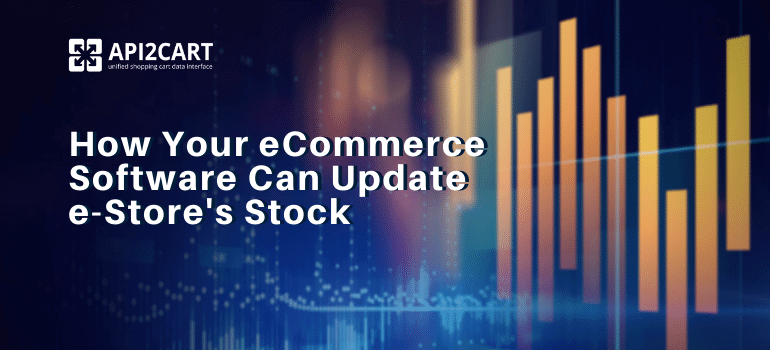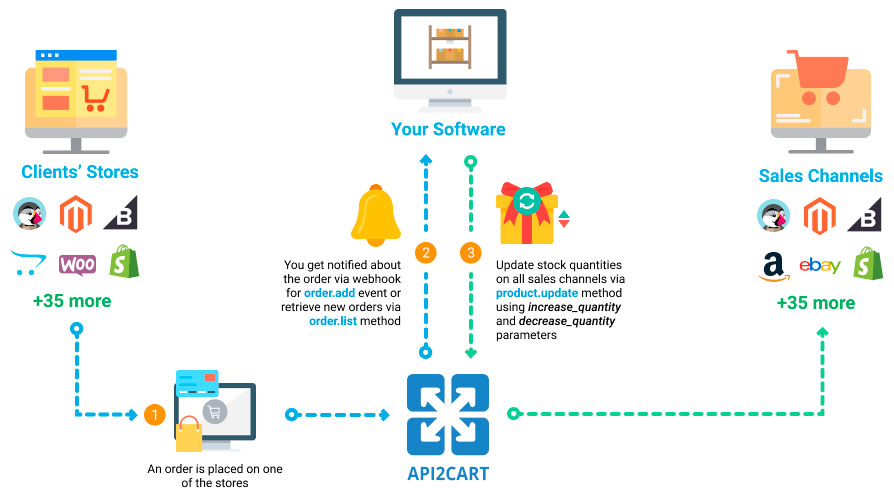
Whether you are the inventory software provider, a warehouse management software provider, or a multichannel software company, you need to be able to update the e-store's stock of retailers. Working with eCommerce store owners involves keeping tabs on their inventories and ensuring they never run out of products.
It becomes futile for eCommerce shop owners to invest in SEO and PPC just to draw people to their stores if they cannot fulfill orders effectively. This is not just a waste of time and money, but could also spell in negative NPS (net promoter score). In order to help your clients succeed, it is imperative to offer them reliable inventory updating services.
eCommerce software like Sellercloud and Katana are willing to go above and beyond to offer quality services, helping shop owners keep track of the inventory they have at a given moment in time. With similar solutions, e-retailers no longer have to perform manual stock updates and waste precious time trying to determine when they need a refill.
Because eCommerce is all about making profits by selling as many products as possible online, it becomes mandatory for e-store owners to work with SaaS app providers to manage, update, and optimize their stocks effectively. That’s where you come in, syncing the inventory across multiple eCommerce platforms and ensuring your clients’ stocks are always updated correctly.
In this article, we are going to discover how exactly you can develop the integration between your software and various shopping platforms easily and fast. Moreover, we will provide you with detailed info on how your system will be able to access the data from your clients’ stores and update e-store's stock with no difficulties.
Why is eCommerce Integration Inevitable if You Work with Online Retailers?
To properly update e-stores’ stocks and make sure your clients never run out of products to sell, you need to invest in eCommerce integrations. Basically, you need to be able to sync inventory levels, track product updates, and sync orders, all of that to ensure that no potential e-stores' buyers who land on the site and want to make a purchase leave disappointed because of a specific product is not in stock anymore.
You need to integrate your software with shopping platforms because this allows you to control and coordinate various business processes, such as product management, order management, and inventory management.
The development of seamless integration with shopping platforms is a must if you want to offer your service to many potential customers who own e-stores. These integrations enable you to access platforms’ databases and gain precious info on orders, products, inventory, shipments, and the list goes on. Additionally, it allows your solution to organize the data into feeds and perform updates across multiple e-retailers’ sales channels.
Regardless of the software you offer, be it warehouse management, inventory management, app building, or multichannel services, you want to ensure that your system is integrated with the biggest eCommerce marketplaces and shopping platforms out there.
The data available in the stores’ can power the majority of your software functions. Shopping platform integration creates a critical link in the chain and enables your company to perform the following:
- Keep your clients’ inventory synchronized across all of their sales channels
- Track the inventory from the moment of its receiving to shipping
- Optimize inventory effectively
- Update e-store's stocks fast
The quality of your eCommerce software is directly dependent upon your quality level of integration with shopping platforms. Of course, for integration development, you need to make sure that professionals perform it.
The good news is that you don’t need to invest vast amounts of time & money trying to find expert developers who can take care of the integration of your eCommerce software with shopping platforms and marketplaces such as Shopify, WooCommerce, Amazon, eBay, Squarespace, Ecwid or PrestaShop. All you need to do is to use API2Cart.
API2Cart is an API integration solution that enables you to seamlessly connect your software with the APIs of over 40 platforms at once and get access to all the required data from them. With the help of API2Cart API methods, you will be able to manage the data connected with orders, products, inventory levels, customers, shipments, etc.

To get practical, we want to show you exactly how you can easily update the e-store's stock using API2Cart.
How Can You Update e-Store's Stock Easily?
Keeping stocks accurate is imperative for success for any eCommerce store. A lot of software providers who operate in the sphere of inventory and warehouse management should be able to provide such functionality.
The methods API2Cart provides for updating e-store’s stock are order.add, order.list and product.update. As a SaaS provider, you can quickly get a list of all the products available on the store using the order.list method, or use the webhook for order.add method to get the list of new orders.
To update stock quantities across all channels, you can use the product.update method. This involves using the increase_quantity or decrease_quantity parameters.

API2Cart offers you the benefits of accessing and managing all the data needed for keeping your client’s inventory levels up-to-date and accurate, updating the stock in real-time, and syncing inventory across multiple eCommerce platforms.
Conclusion
Shopping platform integration via API2Cart enables you to save up to 80% of your developers’ time when performing integrations, minimize your TCO, win new customers, and expand your market share. Our platform is trusted by the best SaaS providers who work in the eCommerce sphere.
Try API2Cart for 14-days for free now by simply registering a new account.
Find out more about our services by contacting us below.



